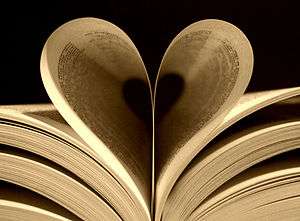Bibliophilia

Bibliophilia or bibliophilism is the love of books, and a bibliophile is an individual who loves books.
Profile
The classic bibliophile is one who loves to read, admire, and collect books, often amassing a large and specialized collection. Bibliophiles do not necessarily want to possess the books they love; an alternative would be unusual bindings, autographed copies, etc.[1]
Usage of the term
Bibliophilia is not to be confused with bibliomania, an obsessive–compulsive disorder involving the collecting of books to the point where social relations or health is damaged, and in which the mere fact that an object is a book is sufficient for it to be collected or loved. Some use the term "bibliomania" interchangeably with "bibliophily", and in fact, the Library of Congress does not use the term "bibliophily," but rather refers to its readers as either book collectors or bibliomaniacs.[2] The New York Public Library follows the same practice.[3]
History
According to Arthur H. Minters, the "private collecting of books was a fashion indulged in by many Romans, including Cicero and Atticus".[4] The term bibliophile entered the English language in 1824.[5] A bibliophile is to be distinguished from the much older notion of a bookman (which dates back to 1583), who is one who loves books, and especially reading; more generally, a bookman is one who participates in writing, publishing, or selling books.[6]
Lord Spencer and the Marquess of Blandford were noted bibliophiles. "The Roxburghe sale quickly became a foundational myth for the burgeoning secondhand book trade, and remains so to this day"; this sale is memorable due to the competition between "Lord Spencer and the marquis of Blandford [which] drove [the price of a probable first edition of Boccaccio's Decameron] up to the astonishing and unprecedented sum of £2,260".[7] J. P. Morgan was also a noted bibliophile. In 1884, he paid $24,750 for a 1459 edition of the Mainz Psalter.[8]
See also

- Antiquarian book trade in the United States
- Book collecting
- Caxton Club
- The Club of Odd Volumes
- Grolier Club
- Oxford University Society of Bibliophiles
Notes
- ↑ Carter, John (1952). ABC for Book Collectors.
- ↑ Library of Congress
- ↑ New York Public library search
- ↑ Minters, Arthur H. (1979). Collecting Books for Fun and Profit. New York: Arco Publishing Inc. ISBN 0-668-04598-1.
- ↑ Merriam-Webster: bibliophile
- ↑ Merriam-Webster: bookman
- ↑ Connell, Philip (2000). "Book Collecting: Cultural Politics, and the Rise of Literary Heritage in Romantic Britain". Representations 71: 24–47. doi:10.1525/rep.2000.71.1.01p00764.
- ↑ Basbanes, Nicholas (1995). A Gentle Madness: Bibliophiles, Bibliomanes, and the Eternal Passion for Books. New York: Henry Holt.
References
- Merriam-Webster, Inc. (1996). Merriam-Webster's Collegiate Dictionary (10th ed.). Springfield, Mass: Merriam-Webster, Inc. ISBN 0-87779-709-9.
Further reading
- Basbanes, Nicholas A. (1995) A Gentle Madness: Bibliophiles, Bibliomanes, and the Eternal Passion for Books, Henry Holt and Company, Inc.
- Richard de Bury (1902). The love of books: The Philobiblon translated by E. C. Thomas. London: Alexander Moring
- Rugg, Julie (2006). A Book Addict's Treasury. London: Frances Lincoln ISBN 0-7112-2685-7
- Thomas Frognall Dibdin (1809). Bibliomania. New York, Henry G. Bohn.
- Andrew Lang (1881). The Library. London, Macmillan & Co.
External links
| Look up bibliophilia in Wiktionary, the free dictionary. |
- Forbes article on bibliomania by Finn-Olaf Jones, December 12, 2005
- Booknotes interview with Nicholas Basbanes on A Gentle Madness: Bibliophiles, Bibliomanes and the Eternal Passion for Books, October 15, 1995.
|